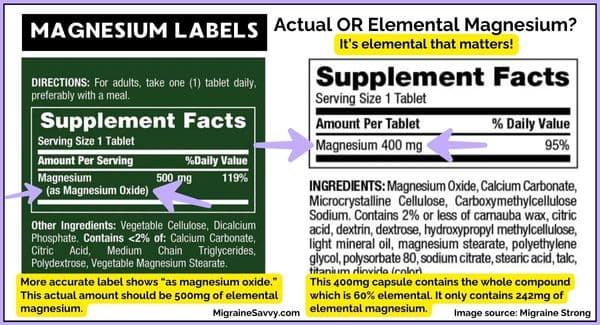- Home
- Migraine Relief
- Which Magnesium Is Best for Migraines
Which Magnesium is Best for Migraines?
Recommended Types for Relief and Prevention
If you are wondering which magnesium is best for migraines, you are not alone. Magnesium is one of the most widely recommended supplements for migraine prevention, yet many people take the wrong form or dose and assume it doesn't work.
The truth is that different forms of magnesium behave differently in the body. Absorption rates vary. Digestive tolerance varies. Brain penetration varies. Choosing the correct type makes a significant difference.
 Different forms of magnesium support migraine prevention in different ways, including brain health, energy production, and digestive support
Different forms of magnesium support migraine prevention in different ways, including brain health, energy production, and digestive supportQuick Answer: Magnesium glycinate and magnesium threonate are typically the most effective forms for migraine prevention due to their absorption and neurological support. However, your ideal choice depends on your symptoms, digestive tolerance, and overall health.
Magnesium must be taken consistently for prevention. It is not designed to stop an acute migraine attack.
This is a great infographic courtesy of Swanson's Vitamins, but not all of these are recommended for migraine relief.
Understanding Magnesium's Role in Migraine Prevention
Migraine is not simply a vascular issue. It is a complex neurovascular disorder involving altered brain signaling. Magnesium acts as a stabilizer within these pathways.
Research suggests that many people living with migraine have lower magnesium levels, particularly during attacks, which is why maintaining adequate levels may help reduce attack frequency and severity.
Magnesium helps regulate several important neurological processes:
Neural Excitability:
Magnesium acts as your brain's natural calm-down button, helping prevent the increased neural excitability that can lead to migraine attacks. This can also help reduce pain signals.
Key Neurotransmitters:
It helps balance important brain chemicals including:
- Serotonin (mood and pain regulation)
- Glutamate (pain processing)
- CGRP - Calcitonin Gene-Related Peptide (inflammation and pain signals)
Cellular Energy Production:
Magnesium is crucial for cellular energy production, helping maintain the energy balance in your brain cells.
Reduces Neurogenic Inflammation:
Research shows magnesium can help lower neurogenic inflammation, a key factor in migraine development.
Before choosing a specific form, it helps to understand the research behind magnesium for prevention in Can Magnesium Help with Migraine? What the Research Shows.
 Which Magnesium Is Best for Migraines? Compare the 4 most effective forms: glycinate, threonate, malate and citrate
Which Magnesium Is Best for Migraines? Compare the 4 most effective forms: glycinate, threonate, malate and citrateWhich Magnesium is Best for Migraines? The 4 Most Effective Forms
Not all magnesium supplements are absorbed equally. The compound attached to magnesium affects how it is used in the body.
1. Magnesium Glycinate
Magnesium glycinate is one of the most bioavailable forms, making it highly absorbable with minimal gastrointestinal side effects. Glycinate is bound with glycine, an amino acid that can have a calming effect, reducing anxiety-related migraine attacks and supporting sleep.
Because it is well tolerated, it is frequently recommended as a first choice.
- It has strong absorption and is typically well tolerated
- Super gentle on your stomach
- Bonus calming effects that can help with migraine-related anxiety
- Unlikely to cause the digestive issues common with other forms
It is ideal if you:
- Have sensitive digestion
- Experience anxiety-related migraine triggers
- Struggle with sleep
When to Take It: 1-2 hours before bedtime, as it can support better sleep quality too.
2. Magnesium Threonate (or L- Threonate)
Magnesium L-threonate is unique because it crosses the blood-brain barrier more efficiently than many other forms.
This quality makes it a great choice if you suffer from cognitive symptoms, such as brain fog, which can be a common symptom during migraine attacks.
Why It's Special – Best for Brain Health
- Targets brain function directly
- Helps reduce brain fog
- May improve cognitive function between attacks
- Shows promising research for neurological health
This form may benefit you if you:
- Have cognitive symptoms with your migraine attacks
- Want to improve mental clarity
- Experience brain fog
- Need help with mood regulation
When to Take It: In divided doses, morning and evening. Or take your evening dose just before bed to help with mood regulation and sleep.
Pro Tip: While more expensive, you can combine a lower dose of threonate with glycinate for broader coverage. Take it with a meal to reduce stomach upset and diarrhea.
3. Magnesium Malate
Magnesium malate combines magnesium with malic acid, which supports ATP production and cellular energy. It has a great absorption rate (higher bioavailability) and is gentle on the stomach.
This combination makes it especially useful if you have overlapping conditions, such as fibromyalgia and chronic fatigue syndrome, alongside migraine headaches.
This form may help if you experience:
- Fatigue
- Muscle pain and tension
- Fibromyalgia or overall pain sensitivity
- Low daytime energy
It is typically taken in the morning.
Personally, this form has been helpful for energy support and chronic pain.
Note: If you notice any digestive issues (diarrhea), start with a lower dose or switch to glycinate. Everyone's body responds differently.
4. Magnesium Citrate
Magnesium citrate is well absorbed but has a stronger laxative effect. Higher doses commonly cause loose stools, so it's important to start low and increase gradually.
Plus, some migraine medications can cause constipation this form can be helpful for you to get things moving.
If you struggle with bloating, constipation, or other digestive symptoms alongside migraine, you may want to read more about digestion problems here.
Best for Digestive Support:
- High absorption rate
- Helps with digestive regularity (relieves constipation)
- Well-studied for migraine prevention
- Often more affordable
When to Take It: Early in the day.
TO RECAP:
Magnesium Glycinate – first-line option
Magnesium L-Threonate – cognitive support
Magnesium Malate – energy support
Magnesium Citrate – digestive support
My #1 Choice in Magnesium Supplementation
Forms I Do Not Recommend
Some forms of magnesium are poorly absorbed or may worsen symptoms. Choosing a well-absorbed form reduces trial and error.
Let's quickly cover what to avoid:
- Magnesium Oxide: Despite being common and cheap, it's poorly absorbed and often causes digestive issues.
- Magnesium Sulfate: While great for baths, it's not ideal for regular supplementation.
- Magnesium Glutamate: May actually trigger headaches in some people.
- Magnesium Orotate: Used to treat symptoms of too much stomach acid, this could be problematic for us as we already have compromised digestive function due to migraine which commonly causes low stomach acid.
- Magnesium Taurate: Proven to promote stable blood sugar levels and reduce heart attacks and improve cardiovascular health, however it may cause stimulating effects that could exacerbate anxiety. Increased anxiety is not good for us. It is one you could test.
Recommended Dosage and How to Take It
Most migraine prevention protocols suggest between 400 and 600 mg of elemental magnesium daily, divided into two doses.
However, starting lower improves tolerance.
A gradual approach may look like this:
Week 1 to 2: 200 mg daily
Week 3 to 4: 300 mg daily
Week 5 onward: Increase toward 400 to 600 mg if tolerated
These values refer to elemental magnesium, not total compound weight.
It often takes four to six weeks of consistent use to evaluate benefit.
How to Read Magnesium Labels Correctly
This is one of the most confusing parts for many people.
Supplement labels often list the compound weight, not the elemental magnesium amount.
In this example below, on the left, the more accurate label shows "as magnesium oxide." This actual amount should be 500mg of elemental magnesium. On the right, the 400 mg capsule contains the whole compound which is 60% elemental. It only contains 242 mg of elemental magnesium.
Always look for the word “as” on the label. The amount listed next to “magnesium” represents the elemental magnesium.
It's the elemental that matters.
 Always look for the word "as" on the label. The amount listed next to magnesium represents the elemental magnesium
Always look for the word "as" on the label. The amount listed next to magnesium represents the elemental magnesium
Also review:
- Serving size
- Number of capsules required
- Third-party testing
- Filler ingredients
Fillers such as magnesium stearate, cellulose, or unnecessary additives may trigger symptoms in sensitive individuals. There are better choices for fillers, like rice or ginger for example, so it pays to look for that.
Clean labeling matters.
Delivery Methods and Absorption Differences
Magnesium can be delivered in multiple ways.
Oral capsules and powders are the most convenient and practical for prevention.
Intravenous magnesium is sometimes used in hospital settings for acute migraine treatment, but this is medical therapy and not routine supplementation.
Transdermal oils and sprays may provide supplemental support but are unlikely to replace oral intake for prevention.
Liposomal and sublingual types are more easily absorbed.
Digestive health can significantly affect how well you absorb supplements, which is why supporting your gut function is often part of a migraine prevention strategy.
Choosing the correct form and delivery method can improve the results of your whole migraine management plan.
Safety, Testing, and Side Effects
While magnesium is generally safe, high doses can cause side effects like:
- abdominal cramps
- low blood pressure
- diarrhea
- loss of appetite
- mental changes
- irregular heartbeat
- nausea
- problems breathing
Important: Consult your doctor if you have any pre-existing conditions, particularly kidney issues, as magnesium can accumulate in people with kidney dysfunction. As with any supplement, magnesium can interact negatively with other medications... so it's essential to check with your doctor before trying to find which magnesium is best for migraines for you.
Should You Test for Deficiency?
When trying to find out which magnesium is best for migraines, getting tested for magnesium deficiency can help you make an informed decision about supplementation.
A standard serum magnesium test does not always reflect intracellular magnesium status.
Some physicians recommend an RBC magnesium test, which may provide a clearer view of magnesium levels inside cells.
Testing can help guide dosing, particularly if you are unsure about deficiency.
Discuss supplementation with your primary healthcare provider to help with long-term prevention and overall health benefits.
My Recommended Options
If you prefer testing single forms individually, look for clean, well-tested brands that clearly list elemental magnesium.
If you prefer a comprehensive approach, a full-spectrum magnesium formula that combines multiple forms may simplify supplementation.
I currently use and recommend BiOptimizers Magnesium Breakthrough as a full-spectrum option because it includes several forms in one product and simplifies dosing.
Use code SAV10 for 10 percent off.
Full disclosure: Some links on this page are affiliate links. If you choose to purchase through them, I may earn a small commission at no additional cost to you. I only recommend products I personally use and that align with current migraine research and clinical practice.
My #1 Choice in Magnesium Supplementation
Best Overall: BiOptimizers Magnesium Breakthrough
- Why I love it: Combines 7 forms of magnesium for comprehensive support
- Key benefit: Full-spectrum coverage for different bodily needs
- Dosing: Follow label instructions for gradual introduction
Best Single-Form Options:
1. Thorne Research Magnesium Bisglycinate
- Perfect for beginners, easy to dose powder
- Gentle on digestion
- High absorption rate
2. Pure Encapsulations Magnesium (Citrate/Malate)
- Great value
- Clean ingredients
- Reliable brand
3. Life Extension Neuro-Mag Magnesium L-Threonate
- Best for cognitive symptoms
- Crosses blood-brain barrier
- High-quality formulation
FAQs on Magnesium and Migraine Relief
Click on the little down arrow for the answer.
Can I take magnesium during a migraine attack?
Can I take magnesium during a migraine attack?
Answer: There is limited evidence that oral magnesium is effective during an acute migraine attack. Magnesium is primarily used for prevention. In hospital settings, intravenous magnesium may be used under medical supervision. Always follow your healthcare provider’s acute treatment plan.
How long does magnesium take to work for migraine prevention?
How long does magnesium take to work for migraine prevention?
Answer: Most people require consistent supplementation for four to six weeks before noticing meaningful improvement. Magnesium is not an immediate solution and requires regular use.
Can I combine different types of magnesium?
Can I combine different types of magnesium?
Answer: Yes. Some people combine forms such as magnesium glycinate and magnesium threonate to address multiple symptoms. However, consult your healthcare provider before combining supplements to ensure appropriate dosing.
What about magnesium sprays and creams?
What about magnesium sprays and creams?
Answer: Topical magnesium products may help with muscle tension, but they typically do not provide sufficient systemic magnesium levels for migraine prevention. They can be considered complementary rather than primary therapy.
Can I take too much magnesium?
Can I take too much magnesium?
Answer: Yes. Excess magnesium can cause diarrhea, abdominal cramping, and other side effects. Loose stools are often the first sign that your dose is too high. Stay within recommended guidelines and consult your healthcare provider.
Final Thoughts: Choosing Your Best Magnesium for Migraines
When deciding which magnesium is best for migraines, the answer depends on your symptoms.
If sleep and anxiety are primary concerns, glycinate may be ideal.
If brain fog is dominant, threonate may help.
If fatigue and muscle pain are present, malate may provide support.
If constipation is an issue, citrate may be appropriate.
Magnesium is not a quick fix. It requires consistency, patience, and proper dosing.
When used correctly, it can be a valuable part of a long-term migraine prevention strategy.
Always consult your healthcare provider before beginning supplementation.
Here Are My Recommendations:
As an Amazon Associate, I earn from qualifying purchases - affiliate-disclosure.
Ready to take the next step?
Choose the next step that fits where you are right now.
MIGRAINE RELIEF Related Articles
Which Magnesium is Best for Migraines References:
1. National Institutes of Health, Office of Dietary Supplements (2026) Magnesium: Fact Sheet for Consumers. [Online], Available at: https://ods.od.nih.gov/factsheets/Magnesium-healthProfessional/. Initial access Feb. 4, 2018 | Updated March 2026.










